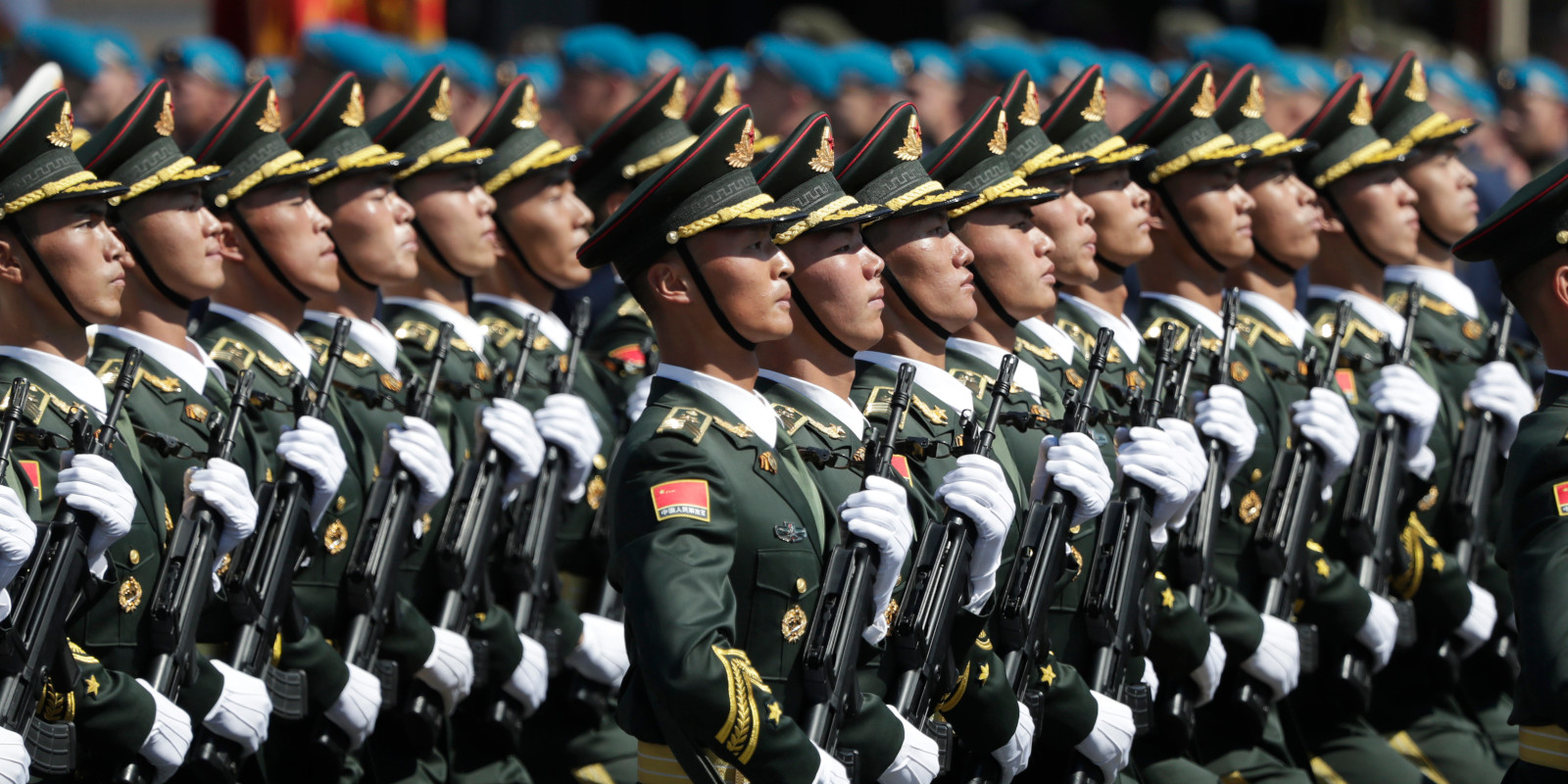Today’s Hub Dialogue is with defence and national security policy expert Elbridge Colby.
Colby served as the Deputy Assistant Secretary of Defense for Strategy and Force Development in the Trump Administration and is the author of the fascinating new book, The Strategy of Denial: American Defense in the Age of Great Power Conflict.
He’s a big thinker who bucked the foreign policy consensus that was in favour of the Iraq War and has continued to advance a realist perspective, including with respect to the growing great power competition with China where his point-of-view is gaining intellectual and political ground in Washington.
This conversation has been revised and edited for length and clarity.
SEAN SPEER: Elbridge Colby’s thinking and writing is a powerful entry point into the major defence and security issues and debates that will shape the coming years. I’m honoured to speak with him today. Thanks for joining us.
ELBRIDGE COLBY: Thanks very much for having me. It’s a real pleasure.
Neoliberalism’s failures
SEAN SPEER: As your former roommate, Ross Douthat, wrote in his New York Times column on September 11, 2021, you were right when virtually everyone else was wrong about the post-9/11 decision to invade Iraq. What did you see that others didn’t? And what, in your view, blinded the foreign policy establishments to the risks?
ELBRIDGE COLBY: I wouldn’t want to overstate my prescience, but that’s a good question. I would say that I’ve been a true conservative when the American center-right foreign policy elite were ostensibly conservative, but in practice, they didn’t call into question the basic neoliberal assumptions of the 1990s. In some sense, they were almost just more vehement and belligerent advocates for them than their liberal proponents. I always found that strange.
Ross and I go back to our time in college together, where we were part of a conservative newspaper at the time. He and I don’t agree on everything, but there was a fundamental commonality: a self consciously conservative view on domestic affairs. But, in the foreign policy realm, it was striking how it was dominated by a strong neoliberalism, typified by Robert Kagan and Bill Kristol. Kagan, for instance, I don’t think is a conservative in any meaningful sense, from what I can tell.
To me, conservatism and realism are cognate. They may be different—obviously, for instance, there are a lot of people who are realists whose political preferences are progressive—but the basic disposition and heuristic between conservatism and realism is similar. It’s being skeptical about the ability of grand projects, like say the invasion and pacification of Iraq, and instead focusing on order, and relatedly, nearer responsibilities. You can go back to Weber to find this ethic of responsibility. You take care of your family; then you take your community; your church or synagogue; and then the country.
As for how it felt at the time, it was very lonely, to be honest. There were very few people who were expressing these views in the context of the invasion of Iraq. Now they’re finally being resuscitated. We went through a lot, and a lot of damage was done. One of the reasons that we’re in this sorry state with China is because this hawkish neoliberalism was so ascendant, it knew no bounds. It didn’t take account of power or limits. It didn’t stay focused on what our interests actually are, what our responsibilities really are. And, frankly, a lot of these people are unrepentant, which is pretty remarkable.
SEAN SPEER: You mentioned how the invasion of Iraq was brought about by a broader intellectual consensus around globalization and its underlying neoliberal assumptions. Let me ask a related question: why do you think U.S. policymakers were similarly so slow to see China’s economic and territorial ambitions?
ELBRIDGE COLBY: Well, I think it’s related. It’s rooted in these neoliberal assumptions. I think people really believed them. And they believed that China is the liberal idea put to the test—the ultimate, most consequential test—will globalization and the spread of capitalism ultimately lead to greater global stability and democratic reforms in China that transcend geopolitics?
Intellectual assumptions about China have led to a devastating, catastrophic failure.
The basic premise seemed to be one of the following: either globalization will cause China to change and, if it changes, its interests will align with ours because interests are downstream of values and ideology; or, even if globalization does not change China, we will still benefit because we’ll have cheaper goods and we’ll be more efficient.
Both of these assumptions were untrue. The errors were overdetermined based in part on a mistaken understanding of Fukuyama’s thesis about the end of history. I think it’s unfair to Fukuyama, whose book is actually very sophisticated and nuanced on this point, among others—even though I disagree with him on a lot of things these days, he’s a brilliant thinker. But it was this bowdlerized Fukuyama that was being put into action, and it was, “We’re going make China into a liberal democracy, and then there won’t be any problems, and even if we can’t make it, they’ll be forced to do it. This is the way the world is going, and don’t worry about it.”
I think this has been such a pure vindication of the more realpolitik approach to international relations because even if Hu Jintao and Jiang Zemin didn’t want China to end up where they are, that’s where they are now. It didn’t matter what Jiang Zemin wanted. Who cares? What matters is what’s happening now when they have the power. I think as John Mearsheimer rightly put it in his recent Foreign Affairs essay, these intellectual assumptions about China have led to a devastating, catastrophic failure.
China and strategic realism
SEAN SPEER: You were the lead architect of the 2018 National Defense Strategy, which has been described as, “the most significant revision to U.S. defense strategy in a generation.” What lessons did the new strategy reflect from these post 9/11 failures? And in what ways did the strategy change American policy?
ELBRIDGE COLBY: As someone in the Pentagon put it after we were finished, “It was the most realist document released by the U.S. government since the Cold War.” I took that as a compliment. There were a lot of people involved in this process, so I don’t want to exaggerate my role. I was responsible for it, but Secretary Mattis was ultimately the primary person on the updated strategy.
At a fundamental level, the strategy is basically saying that in the face of great power competition, with the operative word being “power”, we need to focus on favourable regional balances of power, and we need to be prepared for war as a deterrent. Because with the wrong set of incentives, you’re going to find yourself in a bad place.
Basically, the strategy was focused on the great powers, particularly China, because it’s the most powerful, and then focused the defence establishment on being prepared to fight and win wars against those great powers in order to deter them. This is different than previous strategies which would acknowledge various challenges and threats—from China to climate change, and virtually everything in between—and then not have much of a plan to address them. When everything is a priority, it means nothing’s a priority.
There was also a sense that the Pentagon had become focused on counterinsurgency, which was essentially a political action that is somewhat close to policing. And presence activities, like showing the flag, had become what the military of the United States ended up mostly doing. At some level, this is understandable in the post-Cold War period in which there was not a major power to focus on.
But we lost the sense that the military’s fundamental purpose is to be able to fight and win the nation’s wars in order to deter them. That was the basic thing that the National Defense Strategy was designed to do.
SEAN SPEER: What is the strategy of denial to which your book refers? How can denying China’s gains in Taiwan, and more generally around the world, amount to a victory for the U.S. in this great power conflict?
ELBRIDGE COLBY: I don’t love the word “victory” because it connotes something that may be beyond what we can reasonably expect. It sounds a little bit anemic, but I think what we want is to satisfy our geopolitical interests, which are ultimately connected to what we want to protect at home which is ultimately the point.
Denial, in a sense, is a two-level reference. As you suggested, Sean, I think we just became really disconnected from a clear connection between our foreign policy and the concrete interests of our citizenry. This idea that we’re going to democratize the Middle East and pacify whole regions of the world is both futile and also not actually important for Americans’ concrete interests.
The invasion of Iraq made American life worse.
Obviously, there are security considerations, but there are also questions about America’s freedom and prosperity. They were probably made worse by this agenda. I think the invasion of Iraq made American life worse. I mean, we certainly wasted a lot of money. So, we really lost the bubble.
A real impetus behind the book, then, is to think about our interests in as clear, crisp, and rigorous a way as possible. What is it that we’re trying to do in an international system, in which we are dealing with a superpower that is as large an economy as we are? That’s the first time we’ve had such a situation since we dealt with Great Britain in the latter part of the 19th century when we surpassed Great Britain as the largest economy in the world. That is 150 years. It’s been a long time.
We really need to get back to basics and figure out what it is we’re about. I think our basic goal—and this has had a long strain in American foreign policy thought, but it had become recessed in the last generation in particular—is we need to deny another state the ability to become so powerful that they could intrude into our national life and undermine it.
If you go back to Nicholas Spykman and the arguments about how Germany was a threat to the United States, or later when the Soviet Union was a threat, we did not want to let these powers dominate Europe, which was then the critical theater of the world, and by far the largest market area in the world, because, if they had that position they would then be able to coerce us over our economy, and in turn undermine our freedom and prosperity. It’s the same logic today.
If you look at the international system, the only plausible way that could happen is China and Asia. Asia is about half of global GDP, in fact, probably more than that pretty soon, and China is by far the most powerful other state in the international system. So, by deduction, our most important interest is denying China hegemony over Asia.
How do we do that? In simple terms, we build up and we sustain an anti-hegemonic coalition because we can’t do it alone, both for reasons of power but also resolve because Asia is far away. That’s kind of happening right now, with things like QUAD and AUKUS, and so forth.
But China, of course, has its own strategy. They could take us all on at the same time, but that would be very risky and probably self-defeating. I think their better strategy is to try to pick that coalition apart by subjecting a few countries right under the microscope and making them feel the pain. If the Chinese can do that to a couple of countries, and if they show that the Americans aren’t trustworthy enough, that they won’t stand up to them, then countries will say, “Well, I’d rather not live under a hegemonic China but if my alternative is getting zapped by the PRC, then I’m going to take the prudent way out and live to fight another day.” That’s a very real prospect in Asia. What we need to do, then, is be strong enough, resolute enough, and capable enough to help countries stand up to China if they are subjected to that kind of treatment.
There’s an economic dimension to China’s strategy, but the thing about economics is that it’s very hard to turn economic leverage into really decisive political results. China is finding that out with Australia right now. When you’re really asking for a country’s autonomy—its sense of self-determination—it’s unlikely to give up, and I don’t think that the Taiwanese, for instance, would be at all likely to give up to Chinese economic pressure. In fact, they haven’t been doing it so far.
The bad news out of that is that China’s going to look at the military instrument, and China has a very powerful military that is focused on not only Taiwan but on power projection in the region beyond. And if they can use that to gradually slice away they can do, in a sense, what Prussia did over the course of the 1860s to the early 1870s, then they can radically change the map of the decisive theater, before anybody really knows it, through a series of small wars.
You can have system-level consequences based on smaller conflicts, and that’s what we want to avoid.
You can have system-level consequences based on smaller conflicts, and that’s what we want to avoid. That’s what the second level of denial is about: our military strategy needs to be focused on denying China the ability to do that. That’s a relative standard, but it basically means denying their ability to successfully invade and occupy targeted countries like Taiwan or the Philippines that are, whether we like it or not, within our defense perimeter. That’s a feasible goal, but we’re not doing it, which is infuriating, because we’re kind of walking with our eyes open towards not only war, but defeat, which would have immense consequences, not only for getting a lot of people killed, but also geopolitical consequences and for our national life if we don’t rectify it.
The importance of Taiwan
SEAN SPEER: The book and your other writing view Taiwan as the epicenter of this strategic competition. What is the likelihood of a Taiwan invasion? How should Washington be thinking about this issue? And what does it mean, in practice, when President Biden and others affirm their “rock solid” support for the Taiwanese?
ELBRIDGE COLBY: Our credibility is tied to Taiwan, whether we like it or not. The Biden Administration has, if anything, strengthened the attachment of our credibility to Taiwan. Now, credibility doesn’t always matter. We lost Vietnam and it probably helped us in Europe and we went on to win the Cold War. We got out of Afghanistan and nobody’s thinking that we’re going to abandon Japan because of it.
But Taiwan matters because it tells you how the United States would behave if China targeted other countries very similarly situated like the Philippines, South Korea, or Japan.
The reason I’m obsessed with Taiwan is precisely because it’s not a cut-and-dried issue. If somebody attacked Canada, whatever we said, we would almost certainly defend Canada because you are literally our neighbour, and we have a strong, vested interest in not allowing China or Russia to take over Canada. But what people will question is whether the United States would actually back up its commitment to Taiwan, and as I mentioned, the value and credibility are already attached and it’s militarily significant.
SEAN SPEER: An alternative to this kind of strategy may be what’s called “cost imposition.” Can you just elaborate on what these tactics represent and why you think they are inadequate responses to growing Chinese aggression vis-à-vis Taiwan?
ELBRIDGE COLBY: There are two ways to get somebody to do something that they don’t want to do. One is to basically directly force them. So, if you’ve got kids, you want them to get in the bath, you take them into the bath, and that’s generally easier. The other way is to persuade them through some mixture of inducements, and the threats of cost or actual costs, and persuade them to get into the bath. Now, that tends to be harder.
Cost imposition can work, in particular, when your resolve is much higher than the other side. So, this is why people tend to think that nuclear weapons are particularly credible if you’re being invaded at home. If you’re Poland in 1939, you see the Nazis coming at you, and you think you’re all going to go to concentration camps, you might be willing to use nuclear weapons because the alternative is so bad. The problem is, in situations in which you don’t necessarily have economic or military advantages or greater resolve, the other side can effectively impose the same costs on you. This is the situation with China. China has a huge economy upon which we are dependent, and they are dependent on us. It’s a mutually assured destruction situation.
If they’re prepared to seize Taiwan militarily, what are we going to do? Well, first of all, they really care about Taiwan, they’ve made that clear. So, we’re going to have to really hurt them to get them to even consider backing off. If you look historically, it’s actually very difficult to make countries give up under these circumstances. A great example is Great Britain in 1940. The Germans wanted to invade, but they couldn’t figure out a way to do it, so then they launched a cost imposition campaign, which was the Blitz and the Battle of the Atlantic. But the Brits were tough; they didn’t want to give up. I think that in Taiwan, it stands to reason, they wouldn’t want to live under a communist dictatorship and would probably do something similar.
What if Taiwan did fall? If the Americans responded by stopping all imports from China, that would probably tank the U.S. economy and the Chinese would have ways to retaliate. They might sell a lot of Treasuries they hold or any number of other things. In any case, I’m not even sure that it would convince the Chinese, by the way. I actually don’t think they would give up even if we did that.
We need to avoid these scenarios. We want to be in a situation like what Air Marshal Hugh Dowding said in 1940: “My job is not to win the war. My job is just to stop the invasion.” From that position, then we can start thinking about winning the war. But we’ve got to focus on the basics first.
What should Canada do?
SEAN SPEER: One final question, Elbridge. Canada finds itself stuck in the middle of a strategic competition between its largest trading partner and its second-largest trading partner. From your vantage point, what advice would you have for Canadian policymakers, as they look out into the century and think about how best to advance Canadian interests in what sounds to be a protracted geopolitical and economic competition between the U.S. and China?
ELBRIDGE COLBY: I’ve been thinking about a lot of other countries and how we, as Americans, should think about their role or what we should ask and recommend. I’ve thought and written about Germany, Japan, Taiwan, South Korea, and others. I haven’t thought that much about Canada, but I think it’s actually really important.
I’ll be very frank: I don’t think it’d be prudent for Canada to be perceived as hedging between the United States and China. As an ally to the United States, there’s an expectation level already set. If we go back to the issue of resolve, America is going to care a lot more about what Canada does than China is going to at the end of the day. So, if Canada is perceived as equivocating—that there’s actually a confrontation that affects the United States and Canada is perceived as equivocating—I think that’s very risky for Canada.
I don’t think it’d be prudent for Canada to be perceived as hedging between the United States and China.
I think the best U.S. ally in the world right now is Australia because Australia recognizes the threat from China. It recognizes its own interests, but it sees its own interests will be served by participating in collective defence. If I look back at the best traditions of Canadian foreign policy, Canada was there in the First and Second World Wars well before the United States was and sacrificed tremendously, and had incredibly robust armed forces to contribute. There’s so much to be proud of.
That’s the proud Canadian legacy that I would speak to, and I think it is in Canada’s interests to recommit to. Because if China is dominant, and if the U.S. is worried about it, I can assure you that Canada should be worried about it even more. We’re the strongest country in the world; we’re the largest economy still, at least in market exchange terms, and we are very concerned. You should be too.
The best route for Canadian engagement in the context of greater power conflict would be to be like Australia. I think the United Kingdom is actually trying to do this as well. The U.K. government, for instance, increased defence spending in the midst of a pandemic. I have some arguments for them about how they should be more focused in Europe and they want to be more involved in Asia, but setting aside these sorts of tactical issues, nobody can question their willingness to put effort into it. Canada, right now, is not. If there’s a perception that Canada is hedging towards China, people are going to notice. I hope we can resuscitate a more traditional Canadian role.
One of the things that Americans need to do is try to orient and work with countries where their interests are most directly engaged, and not ask them to globalize their perspective. With the Europeans, for instance, I’m less interested in the Europeans sending a ship into the South China Sea than I am in the Europeans assuming the primary responsibility for the conventional defence of NATO Europe against Russia. That’s totally within the original vision of NATO and the Europeans can do that. Similarly, I think we should empower India in South Asia, and I think we should work with the Abraham Accords Coalition in the Gulf to take the lead on deterring Iran.
It’s not immediately clear to me where Canada fits into this model. Should Canada focus more on Europe? Or would it actually make more sense as a Pacific state to try to model what the Australians are doing? That’s the kind of question I think that the Canadian strategic conversation should be about: where do we best contribute in a way that’s most natural for us, but where we also have the most optimal impact? That’s the conversation for Canada that I would really like to see.
SEAN SPEER: There’s just a ton of insight here, Elbridge. The book is The Strategy of Denial-American Defense in an Age of Great Power Conflict. Thanks for speaking to us about it.
ELBRIDGE COLBY: Thank you very much. Great to be with you.
Recommended for You

Richard Shimooka: It’s not too late for the federal government to step in and solve the B.C. ferry fiasco

‘You do not have a duty to retreat’: A criminal defence lawyer details how far you can go in defending your family and home

‘It doesn’t actually mean we’re getting richer’: Why a housing boom hasn’t lifted business confidence in Alberta

Need to Know: The curious case of Canada’s missing immigration data



